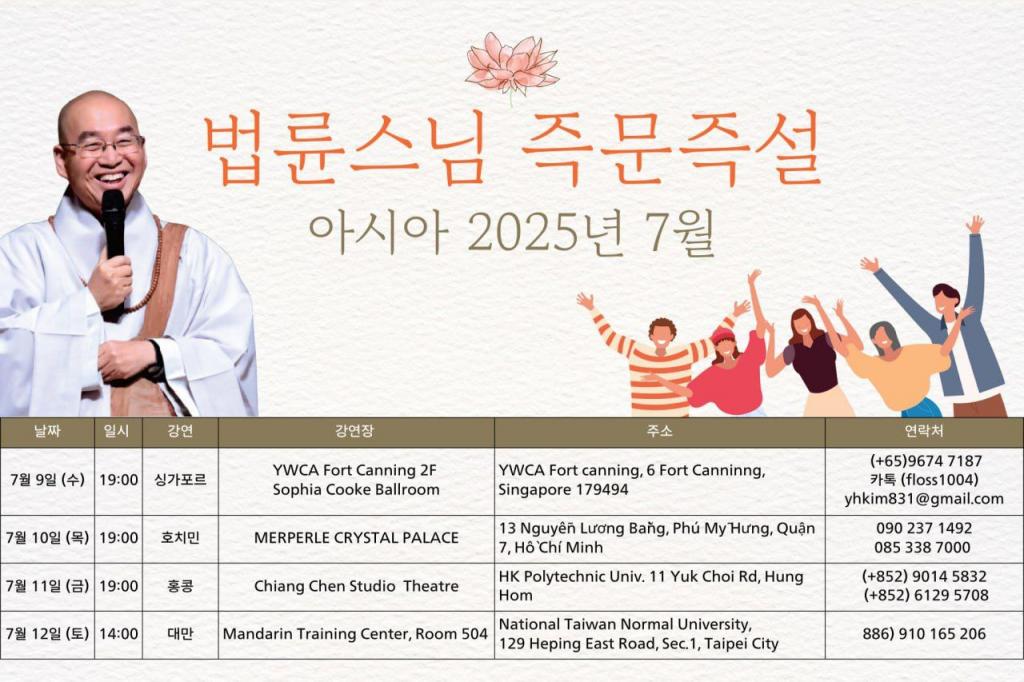Jul 6, 2025 – Meeting with INEB Secretary-General, Cheonjeon-ri and Bangudae Petroglyphs
Good morning. Dawn has broken at Dubuk Jungto Retreat Center.
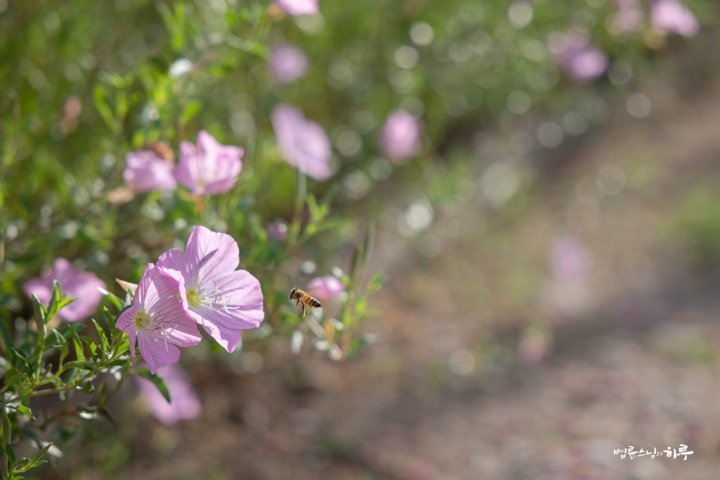
After completing his morning practice and meditation, Sunim went for a walk at 5:30 AM with INEB Secretary-General Moo.
“Since it gets too hot during the day, let’s go for an early morning walk.”
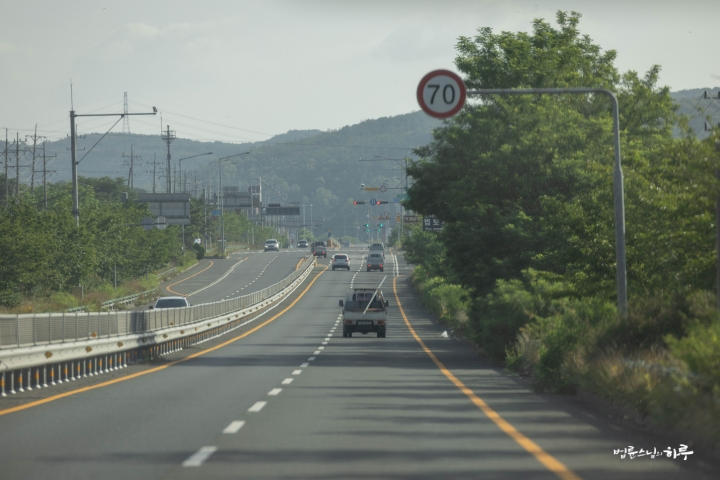
Today, they planned to visit the Cheonjeon-ri Petroglyphs and Bangudae Petroglyphs while taking a walk. After a 20-minute drive from Dubuk Jungto Retreat Center, they arrived at Cheonjeon-ri.
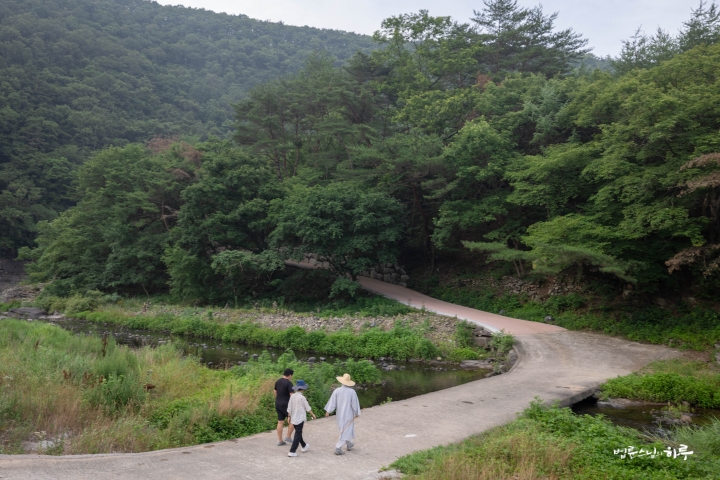
After crossing Daegokcheon Stream and descending the stairs, rock surfaces engraved with various shapes, writings, and drawings appeared along the riverbank. When Moo expressed amazement at the engravings on the rocks, Sunim explained.
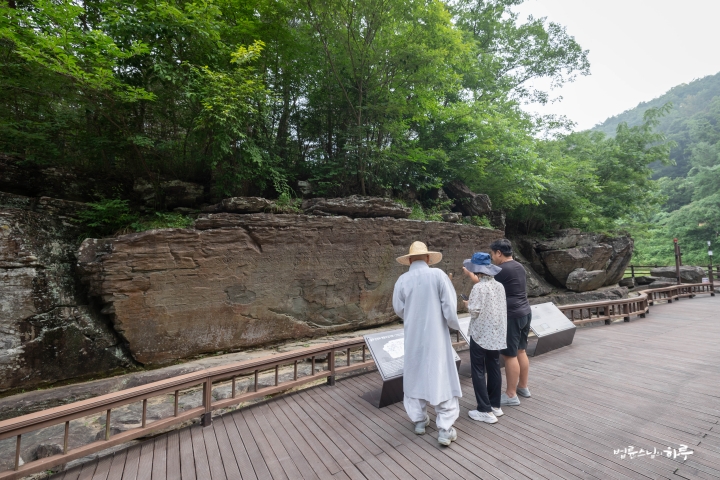
“These Cheonjeon-ri Petroglyphs are a National Treasure. If you look closely at the engravings on the rocks, you’ll see geometric patterns like triangles and circles in the upper section that are difficult to interpret, while the lower section shows characters carved by people during the Silla period. The content of the characters commemorates King Jinheung’s visit here with his mother when he was young.”
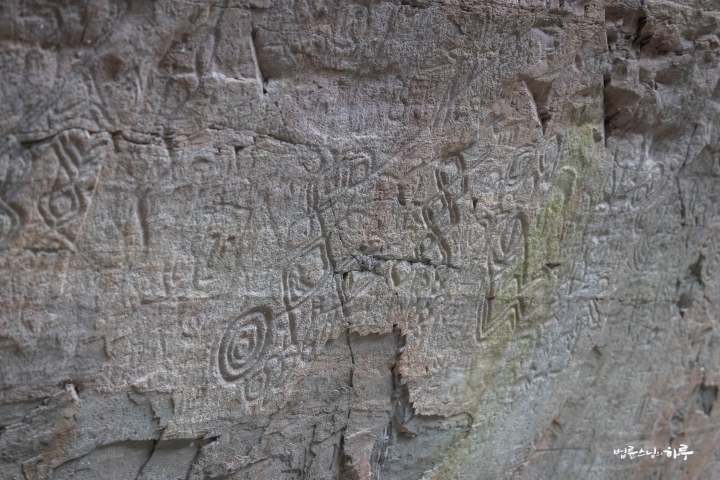
Created by many people over a long period of time, these relics vividly depict life and thoughts from prehistoric times through the Silla period, making them particularly meaningful. Sunim then pointed to the opposite side.
“On the opposite side, there are dinosaur footprints scattered here and there on the sedimentary rocks. Let’s cross the stream and take a look.”
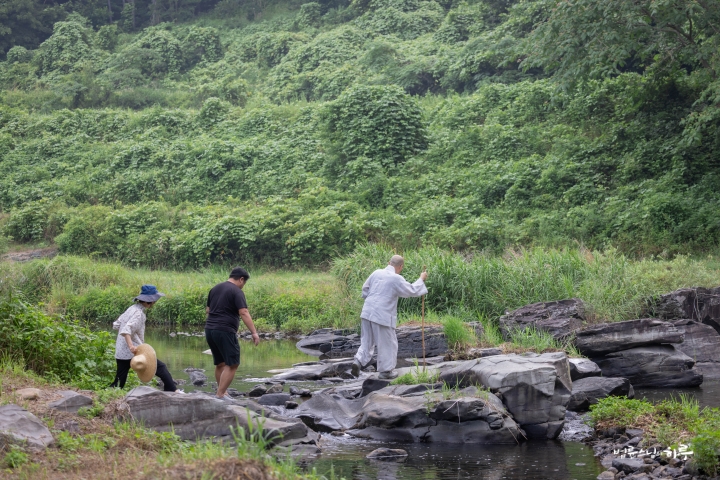
After crossing the stream, dinosaur footprints were clearly visible on the rocks.
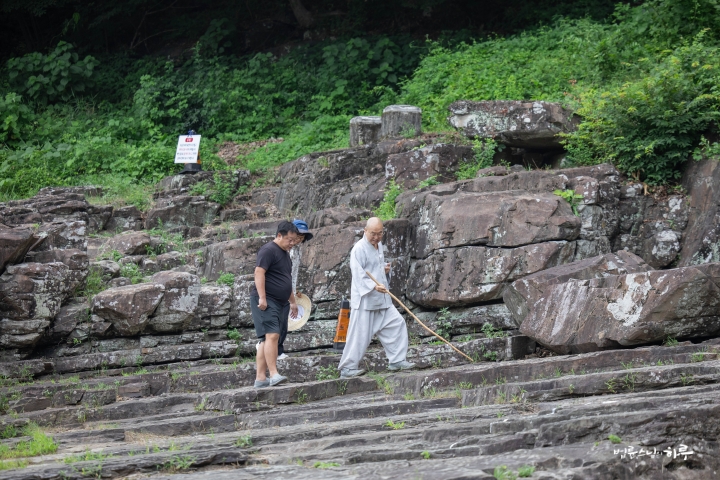

“These are traces of dinosaurs that lived 100 million years ago during the Cretaceous period. When I was young, I used to play here without even knowing these were dinosaur footprints.” (laughter)
Looking around, the scenery of streams, mountains, and rocks harmonizing together was truly beautiful. After thoroughly exploring the area, they began climbing the mountain.
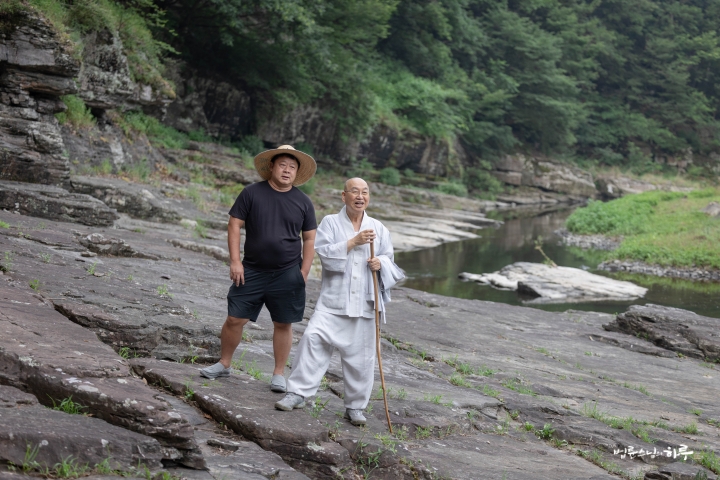
Walking along the valley trail, they breathed in the fresh air deeply. The sun wasn’t hot yet, making it perfect for walking.
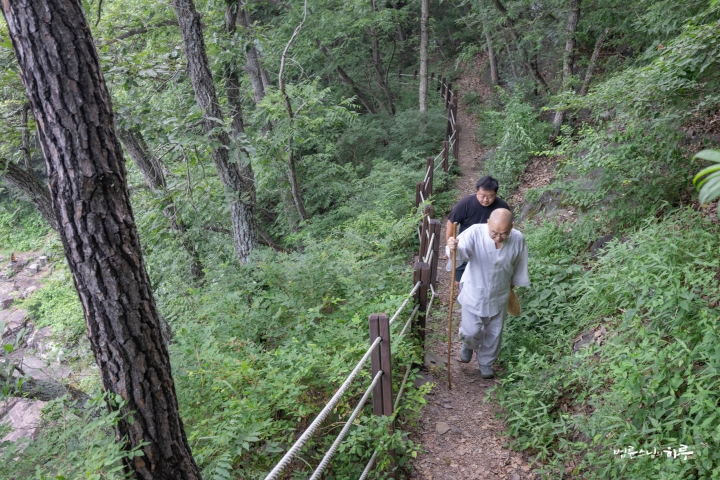
“When I was young, I used to run from here to the Bangudae Petroglyphs. It’s about 5,000 steps to get there, and just walking like this makes you very healthy.”
Between the green leaves, bright orange lily flowers were peeking out.
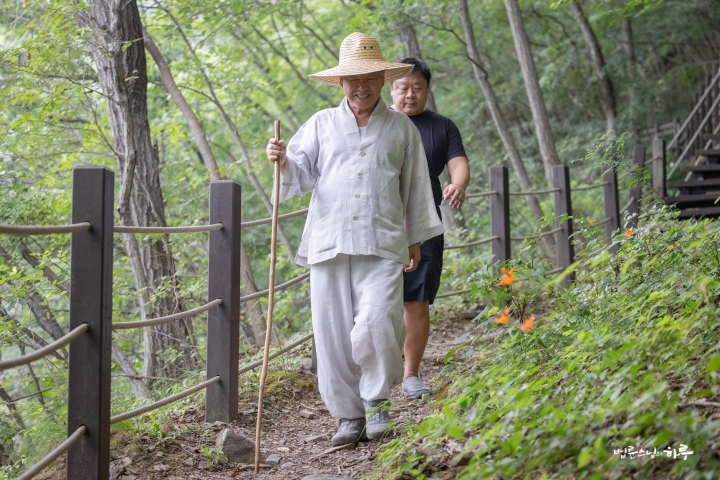
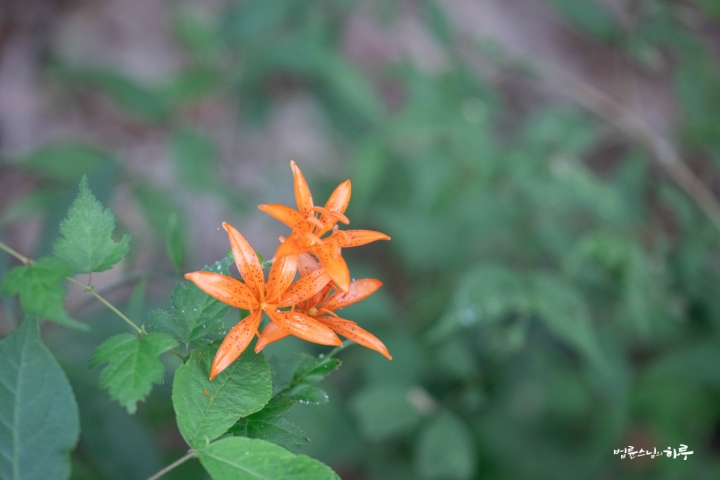
While breathing in the refreshing morning air and having a pleasant conversation, they soon arrived at the Bangudae Petroglyphs.
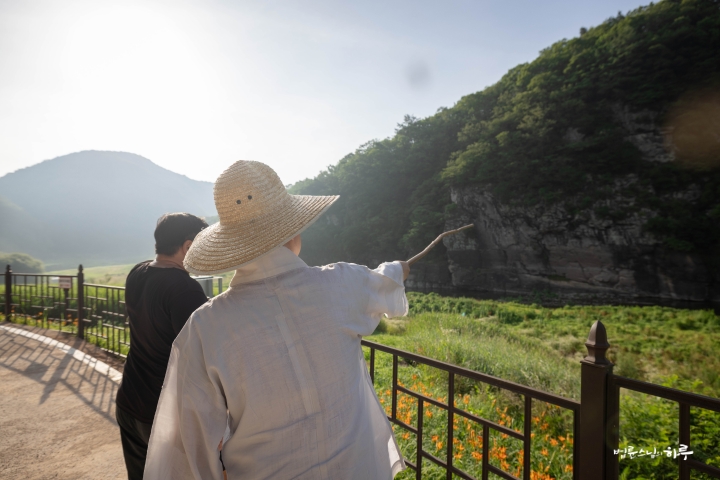
“The petroglyphs are carved on that cliff over there. They’re the world’s oldest whale hunting petroglyphs. There are many drawings of land animals, marine animals, people, boats, nets, and harpoons, with whale drawings being the most numerous.”
The petroglyphs were on the opposite side of the valley, so they weren’t clearly visible to the naked eye. When looking through the telescope, the petroglyphs became clearly visible.
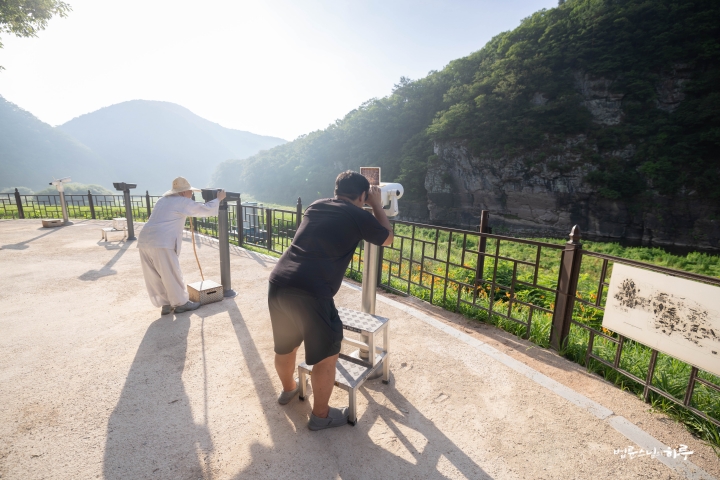
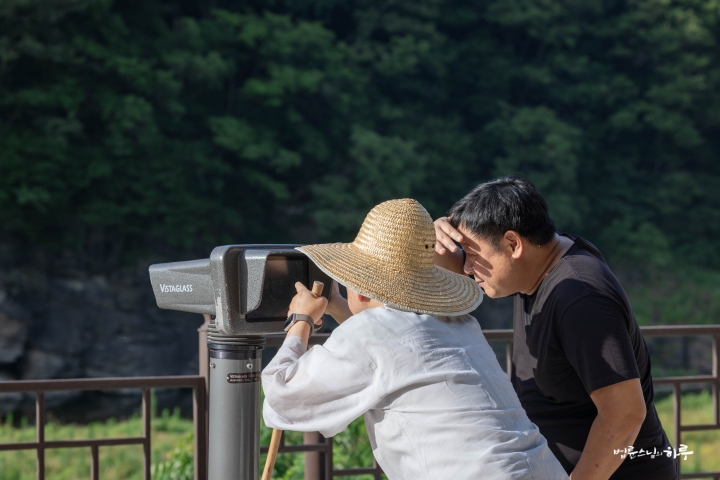
About 200 drawings were carved on the rocks, including land animals, sea fish, and hunting scenes. The images showed harpooned whales, pregnant whales or whales with their young, hunters hunting animals, and fishermen catching whales from boats, revealing the prehistoric people’s wishes for successful hunting activities.

After examining the petroglyphs in detail through the telescope, they walked back along the flat path and got into the car.
“Thank you, I had a great time.”
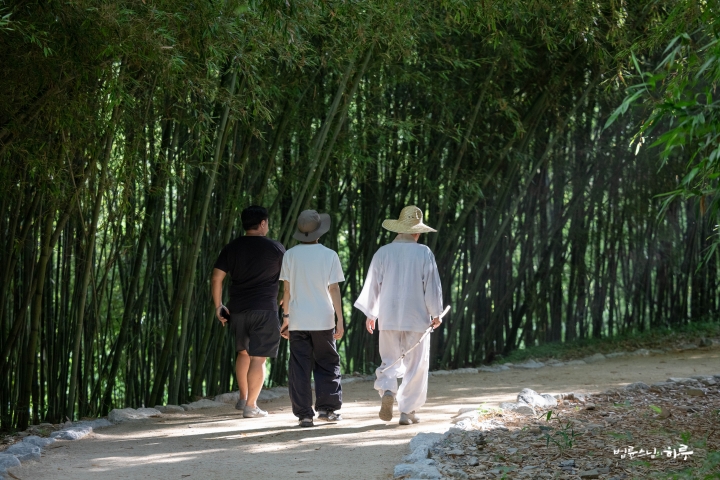
By the time they returned to Dubuk Jungto Retreat Center, the sun was beginning to get hotter.
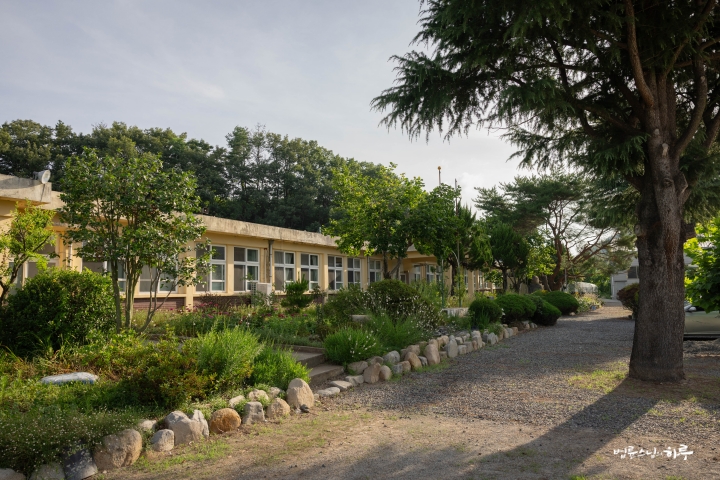
After finishing the walk and having breakfast, Sunim had a meeting with Moo from 9 AM. Continuing from yesterday, they discussed how Jungto Society and INEB could proceed with collaborative projects. After a three-hour meeting, they had lunch together and said their farewells.
“Venerable, I’m heading back after spending such a wonderful time.”
“Alright. Have a safe trip. See you again.”
Moo left for Seoul, and Sunim headed to Pusan National University Hospital in Yangsan by car.
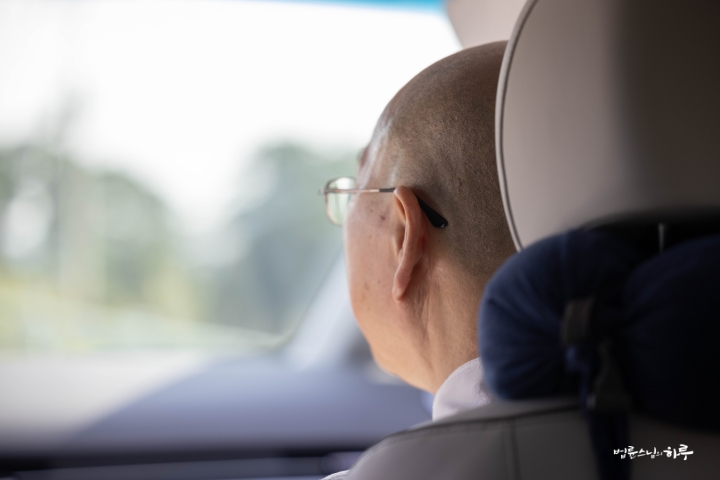
Sunim’s elder brother, who had lived in the United States for a long time, had returned to Korea for treatment due to serious illness. Hearing that his condition had worsened recently, Sunim made an urgent visit to see him. After checking on his health condition, Sunim returned to Dubuk Jungto Retreat Center.
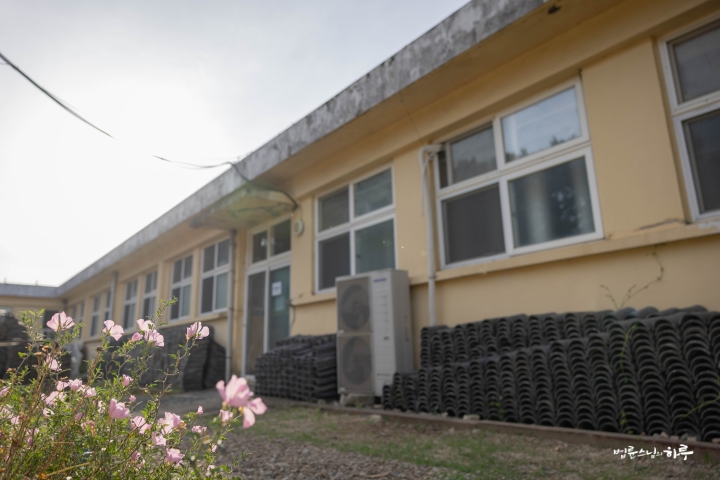
In the evening, Shin Ye-seul and Lee Mi-eun, who have been conducting JTS projects in Bhutan, returned to Korea and had dinner together with Sunim. After encouraging them for accomplishing so much despite the challenges of adapting to the climate and food, they discussed business plans for the main project that will begin in earnest in the second half of the year, concluding the day’s activities.
Tomorrow, Sunim will take an early morning walk on Mt. Namsan in Gyeongju with the lay Sangha Dharma Teachers and then spend the entire day in meetings with them.
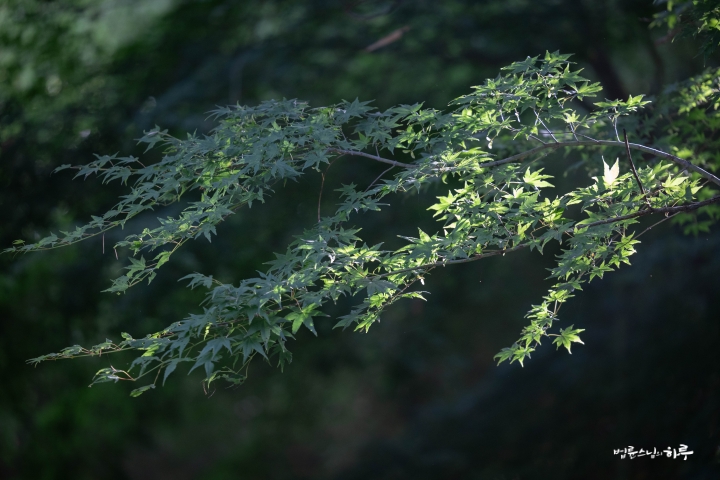
Since there was no Dharma talk today, I’ll conclude by sharing a dialogue between a questioner and Sunim from the Friday Dharma Q&A on the 4th.
Can I Have Both Childcare and Career?
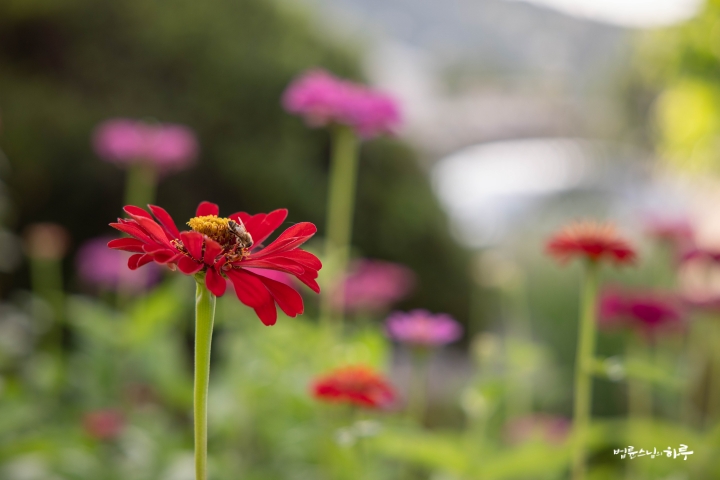
“How can you have two at the same time? Usually, you either catch one and miss the other, or you miss both. Wanting to catch both is greed. If you go to work, you need to accept that your baby might not be emotionally stable. You don’t need to feel guilty, but it’s important to acknowledge this reality. Conversely, if you value your baby’s emotional stability more, you have to accept disadvantages at work. What I want to say is that the choice is yours, and if there’s any loss as a result of that choice, you should willingly accept it. Since you’re not committing a sin, there’s no need to feel guilty or regret. However, you must be prepared to accept the loss from the beginning. For example, if you borrow money, you should be prepared to pay it back with interest. It’s irresponsible to say it was good when borrowing but hard when paying back.
Don’t overthink it. Just like with animals, it’s nature’s way for mothers to care for newborns entirely. This goes beyond human duty – it’s the duty of life itself. Based on historical experience and research, it’s been found that human ego forms up to about age three. That’s why we have the saying ‘habits formed at three last until eighty.’ Modern science has also revealed that the brain grows rapidly until around age three. So if a child is abused or lacks care before age three, the brain may not develop normally, leading to psychological anxiety. This is because the sense of ‘self’ that will remain in the unconscious for life is formed during this period. Since it’s formed rather than inherently existing, unstable formation can lead to lifelong psychological difficulties. That’s why it’s an important role and duty for parents to warmly care for their baby for at least three years to ensure stable ego development. This is why I emphasize that mothers should care well for their babies until age three.
Of course, this doesn’t necessarily mean that direct care by the mother is always best. If the mother has mental illness or is psychologically unstable, it might be better for a nanny to raise the child. In cases of severe marital conflict, it might be better for someone with a stable psychology to care for the baby. In other words, ‘mother’ doesn’t simply mean the person who gave birth, but the person who raised the child. If I raise a child, that child becomes mine; if someone else raises them, they’re not my child. In the past, the person who gave birth usually raised the child directly, naturally becoming the mother, but nowadays, like with surrogacy, the person who gives birth and the person who raises can be different. So in principle, the person who raises is the mother. When babies close their eyes and think of ‘mom,’ they usually recall the image of the person who raised them until age three. The feeling of ‘my baby’ that mothers have is also formed toward the child they held and raised. Sometimes babies get switched at hospitals – while biologically it might not be your baby, biology isn’t that important. If I held and raised them, they’re my baby. If parents pass away, someone else has to raise the child. While it’s most appropriate for the mother to raise the baby, in unavoidable situations, we have to accept it. The best is for the mother to raise the child; if that’s not possible, we must choose the next best option.
I understand that you’ve earned a PhD, changed jobs, and are thinking about your growth as a woman. But to a baby, whether mom has a PhD or not isn’t important. The person who holds and cares for them is what’s most important to the baby. That’s why I say the mother’s role is to make the baby most comfortable. I’m not advocating for mothers or women; I’m advocating for babies who can’t speak. If you truly put yourself in the baby’s position, you wouldn’t be able to say your situation is difficult. You would naturally prioritize raising the baby, so there would be nothing to ask about.
But right now, you can’t prioritize the baby. It’s not just the child’s position that’s important – your position is important too. You’re thinking, ‘How can I give up after earning a PhD, after getting this job, how can I give up this opportunity?’ I understand that. But then you have to accept that the child will suffer some loss. So if the child grows up well later, that’s fortunate, but even if problems arise, you shouldn’t blame the child. You should accept it as ‘I’m sorry. I was trying to survive too, so I couldn’t give you enough attention.’ If you borrowed money, don’t protest when they come to collect – just say ‘I used it well’ and pay it back. With this perspective, there won’t be any problems.
In the old countryside, mothers carried babies on their backs while running stores, farming, or working. But that wasn’t being separated from the baby. They simultaneously fulfilled their role as mothers while cooking and working. It wasn’t because the store work was more important, but because they had to make a living, they did it together saying ‘I’m sorry, baby.’ This is different from the attitude of ‘My job is important, so you go somewhere else. I need to do my work.’ This puts work before the child. It means in the mother’s life, the child is second, not first. When my success comes first and the child comes second, the child may later develop ‘love starvation disease.’ This is because they feel pushed aside. That’s why I say to prioritize the baby, not that you absolutely shouldn’t work. If you carry the baby on your back to work, there’s no problem. Tell your workplace you’ll bring the baby and work. Then you’re not separated from the baby.
That’s why if the government truly cares about the mental health of its citizens, it must establish a three-year paid parental leave system. Paid leave means both financial support and job security. But if three years is difficult, at least there should be one year of paid leave and two years of unpaid leave. In other words, even if they can’t provide money, they should at least guarantee job security. That way, there won’t be career interruptions. Women need to strongly advocate for this when they vote. I believe this is something that absolutely must be achieved. But the reality isn’t like that. Since most places only allow one year of paid leave, you need to propose alternatives like coming to work with your baby on your back or working from home. If the workplace says that’s not possible either, there’s nothing you can do. If you’ve tried and it still doesn’t work out, you have no choice but to send your baby to daycare and go to work, saying “I’m sorry.” But then you must come home quickly after work and hold your baby yourself.
Of course, sometimes you’ll have to attend after-work gatherings or leave your child with someone else. That’s not necessarily wrong. It’s okay to do that, but it may create some kind of emotional void in the child’s heart that could become a source of conflict later. When that happens, just accept it willingly. If you accept it with the attitude of “I’m sorry, my child. Mom had to survive too, so it couldn’t be helped,” there’s no problem. You can live with the mindset of accepting the child’s shortcomings. But people usually regret it later, saying, “If I had known this would happen, I shouldn’t have returned to work then.” But that’s like waving after the bus has already left. There’s no point in waving then.
So the best path is to care for the child directly. If that’s absolutely impossible, the second-best option is to go to work with the baby on your back or work from home. If that’s not possible either, the third-best option is to leave them at daycare but come home immediately after work to care for the child. In other words, even if you’re physically separated, you must always maintain the attitude in your heart that “You are my top priority.” These days, I hear that when someone offers to watch the baby, mothers leave their children and go to swimming pools or go out for fun. Since government subsidies aren’t provided when mothers care for their children directly but are given when they leave them with others, this ultimately results in mothers being separated from their children. But why do politicians propose such policies? Because it helps them manage voters who have voting rights. Babies don’t have voting rights. They’re giving benefits to mothers who have votes. We need to stand from the perspective of “What does the baby want?” Working mothers like you often criticize me for saying these things, saying “Sunim says that because he’s never raised a child.” Even so, I continue to advocate firmly to represent the baby’s position, even if I get criticized.
First, it’s best for mothers to raise their babies directly. Second, if that’s difficult, at least keep the child as your top priority in your heart. You must come home immediately after work to care for the child. This isn’t doing something wrong or committing a sin, so there’s absolutely no need to feel guilty. If you raise your baby with this perspective and they grow up well without any issues, that’s fortunate. Even if some deficiencies arise, don’t blame or regret it; just willingly acknowledge and accept it. I’m not saying that problems will definitely arise if the mother doesn’t raise the child directly. However, no one in the world, no matter how much money they receive or how well they care for the child, can be as good to the child as the mother. So if the mother can’t care for the baby directly, you must be prepared for some slight loss the baby might experience.”
“What resonated most with me was when Sunim said not to feel guilty. Even if something really does happen to my baby later, I’ll just coolly accept it and say I’m sorry.”
“You still can’t let go of the thought of wanting to go to work.” (laughter)
“I’ll choose the third-best option. Thanks to Sunim, I feel much lighter. Thank you.”
▼ Click the link below for detailed information!!!
https://buly.kr/GP32EPn
✔️ Singapore July 9 (Wed) 7 PM YWCA Fort Canning 2F Sophia Cooke Ballroom
✔️ Ho Chi Minh July 10 (Thu) 7 PM MERPERLE CRYSTAL PALACE
✔️ Hong Kong July 11 (Fri) 7 PM Chiang Chen Studio Theatre
✔️ Taiwan July 12 (Sat) 7 PM Mandarin Training Center, Room 504
